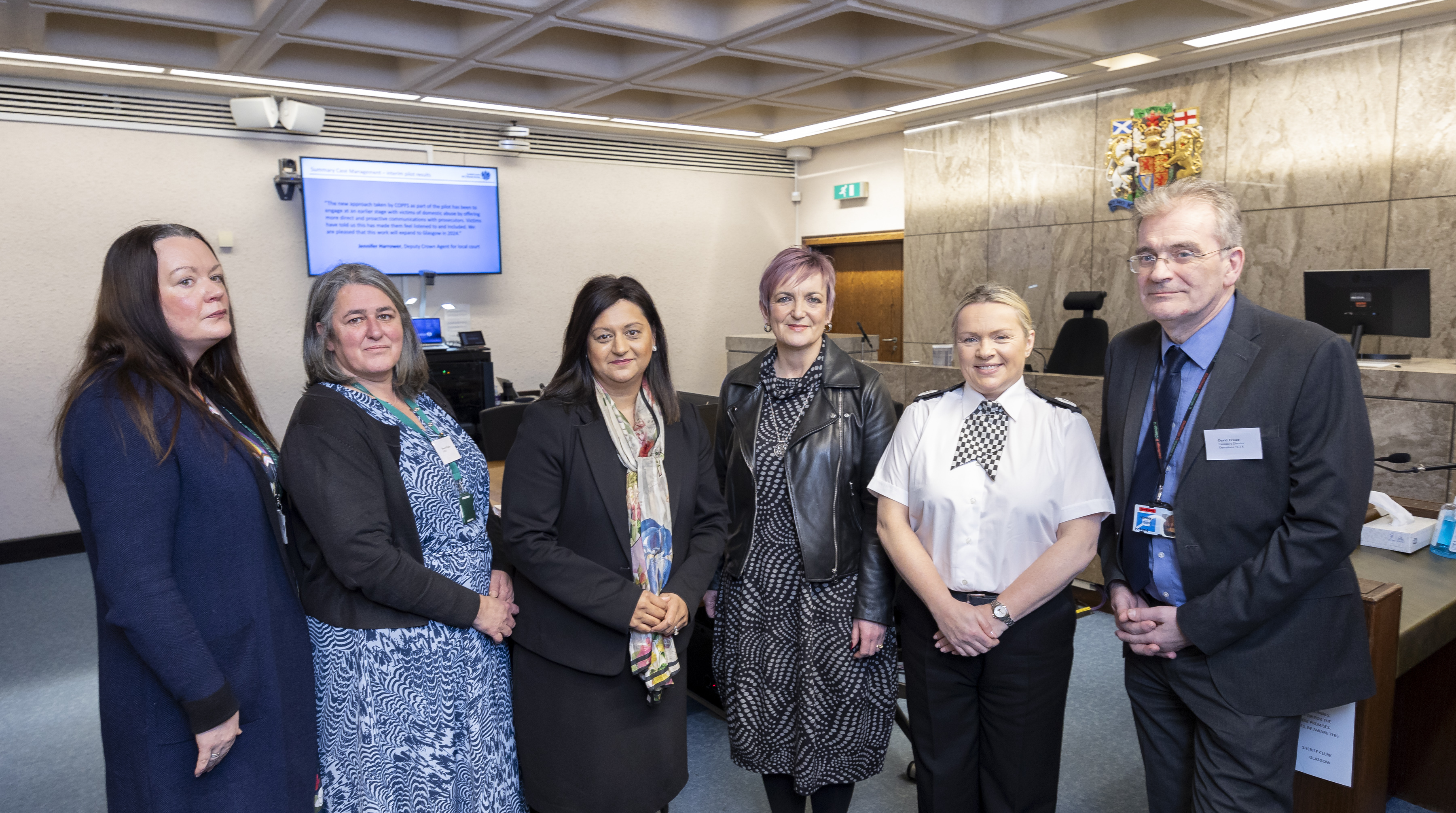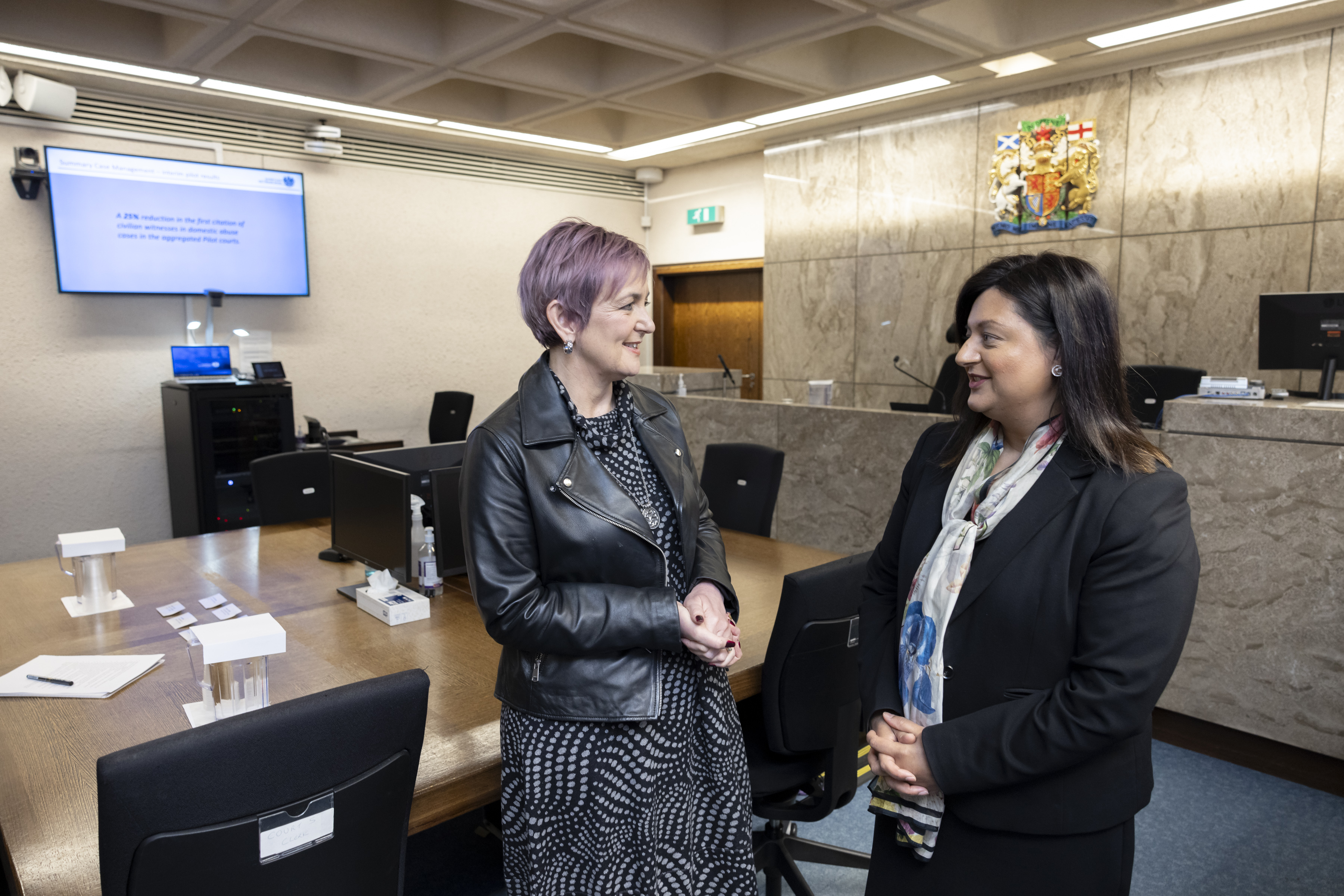A successful pilot, where evidence is shared and, where possible, agreed prior to a trial diet being assigned, has been extended to Scotland’s busiest court – Glasgow Sheriff Court.
The Cabinet Secretary for Justice and Home Affairs, Angela Constance visited the court today (Wednesday 31 January) and heard from Sheriff Principal Aisha Anwar how the Summary Case Management (SCM) Pilot had made a positive impact in reducing the number of victims and witnesses in summary cases having to attend court.

Following the success of the Pilot at Dundee, Hamilton and Paisley Sheriff Courts it has now been introduced for domestic abuse cases at Scotland’s busiest court - Glasgow Sheriff Court.
The SCM Pilot seeks to reduce the number of unnecessary hearings at summary level. It will achieve this by facilitating early disclosure of evidence, early engagement between the Crown and defence and early judicial case management. It aims to reduce the number of cases set down for trial unnecessarily and to reduce the volume of late pleas of guilty and late decisions to discontinue proceedings.
An interim report published in November 2023 revealed that as a result of the Pilot:
- At least 250 summary trials did not require to be assigned in the Pilot courts, directly as a result of early resolution due to SCM;
- There was a 25% reduction in the first citation of civilian witnesses in domestic abuse cases in the aggregated Pilot courts; and
- A 34% reduction in the first citation of police witnesses in domestic abuse cases in the aggregated Pilot courts.
In 2022/23, 2,979 complaints in domestic abuse cases called for an intermediate diet at Glasgow Sheriff Court but just 510 trials were called where evidence was led.
Sheriff Principal Aisha Anwar, who has been leading the development of the SCM Pilot said: “The Pilot aims to improve the efficiency of our summary criminal courts to the benefit of complainers, witnesses, the accused and wider society by reducing the number of cases that are set down for trial unnecessarily. Under the Pilot, with early disclosure of evidence, judicial oversight and meaningful discussions between the Crown and the defence, cases should resolve earlier. I was keen to build on the early success of the Pilot by introducing it to the busiest court in Scotland. That has been possible as a result of excellent cross justice collaboration between the police, the Crown, the defence, SCTS, the judiciary and the Scottish Legal Aid Board and I thank all those involved for their participation.”

Justice Secretary Angela Constance said: “This way of working has radically changed how courts manage summary criminal cases. It has been a great success in the three sheriff courts where it was piloted and has spared victims and witnesses appearing in court to give evidence. I am pleased to see the number of cases that have been resolved without the need for going to trial – freeing up court and police officers time. Expanding this to the Glasgow domestic abuse courts will mean many more victims and witnesses will benefit from early engagement with prosecutors with a view to cases resolving at a much earlier stage, sparing the need for them to attend court.”
Jennifer Harrower, Deputy Crown Agent Local Court, COPFS said:
“The expansion of the pilot to Glasgow is a welcome initiative. COPFS have worked alongside our criminal justice partners on the on-going evaluation of the pilot, which to date has seen matters resolved more efficiently to the benefit of victims and witnesses.
We will continue to collaborate with partners to look at how we are able to meet the concerns of victims through the earliest possible resolution of cases.”
Assistant Chief Constable Wendy Middleton, Criminal Justice, said: “Summary Case Management reduces the number of witnesses required to attend court to give evidence, minimising the impact on both victims and witnesses.
“By using a trauma-informed approach, we work hard to get it right for victims from the first point of contact and this enables us to obtain the best key evidence, to enable early resolution of cases.
“Addressing cases, especially domestic abuse cases, in this way creates a supportive environment for victims and witnesses. It reduces the requirement for them to attend court to give live evidence in the same room as their abuser.
“The current system often means police officers spend considerable time on court business and can have rest time disrupted by requests for attendance. Reducing citations for officers enables them to be in communities preventing crime and addressing threat, risk and harm or availing of rest.”
Kate Wallace, chief executive of Victim Support Scotland said: "We welcome all initiatives that seek to improve the experience of victims and witnesses, and are encouraged by the initial results of the Case Summary Management pilot in reducing the number of people who attend court.
"We are optimistic that it will help to free up court time and reduce the backlog of summary cases, which has impacted so many people affected by crime.
"We will continue to work with justice partners in this pilot and across the board to ensure better experiences and an overall reduced backlog of cases for all victims and witnesses."
The Sheriff Principal has published a Practice Note for the introduction of the Summary Case Management at Glasgow Sheriff Court.